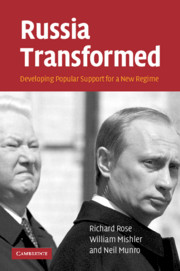Book contents
- Frontmatter
- Contents
- List of figures
- List of tables
- Acknowledgments
- Introduction Transformation and its aftermath
- 1 Time matters: the dynamics of regime support
- 2 The supply of regimes: democratic and autocratic
- 3 A changing supply of Russian regimes
- 4 Uncertainties of transformation: a view from the bottom
- 5 Changing levels of regime support
- 6 Social structure and the evaluation of regimes
- 7 The influence of political values and performance
- 8 Finding the economic influences that matter
- 9 The impact of the passage of time
- 10 What could challenge the new equilibrium?
- Appendix A New Russia Barometer samples
- Appendix B Coding of variables
- References
- Index
9 - The impact of the passage of time
Published online by Cambridge University Press: 22 September 2009
- Frontmatter
- Contents
- List of figures
- List of tables
- Acknowledgments
- Introduction Transformation and its aftermath
- 1 Time matters: the dynamics of regime support
- 2 The supply of regimes: democratic and autocratic
- 3 A changing supply of Russian regimes
- 4 Uncertainties of transformation: a view from the bottom
- 5 Changing levels of regime support
- 6 Social structure and the evaluation of regimes
- 7 The influence of political values and performance
- 8 Finding the economic influences that matter
- 9 The impact of the passage of time
- 10 What could challenge the new equilibrium?
- Appendix A New Russia Barometer samples
- Appendix B Coding of variables
- References
- Index
Summary
Politics is the strong and slow boring of hard boards.
Max WeberWhen the facts change, I change my mind. What do you do?
John Maynard KeynesSupport for a regime is never static, as is implied by theories of democratic consolidation. A steady-state equilibrium is momentarily at rest thanks to the tension created by multiple influences, some favoring support for the current regime while others push in the opposite direction. Therefore, a change in any one influence will affect the overall equilibrium – and this is especially true if all other conditions remain constant. If multiple influences cancel out by changing in opposite directions, then aggregate regime support will appear steady, but underneath the surface there are pressures that could challenge it. When major influences change substantially and do not cancel each other out, this will create a dynamic challenge. Since society is constantly in flux, the longer the passage of time, the less realistic it is to expect the influences contributing to regime support to remain unchanged or to neutralize each other.
The direction in which influences change will always receive attention. Anything increasing support for the current regime will be welcomed. Likewise, anything decreasing support will sound political alarm bells. The scale of change is equally relevant, for, even if a change is statistically significant, its impact may not be large enough to be politically significant: for example, a 3 percent compared to a 30 percent movement in the evaluation of the current economic system.
- Type
- Chapter
- Information
- Russia TransformedDeveloping Popular Support for a New Regime, pp. 166 - 184Publisher: Cambridge University PressPrint publication year: 2006



